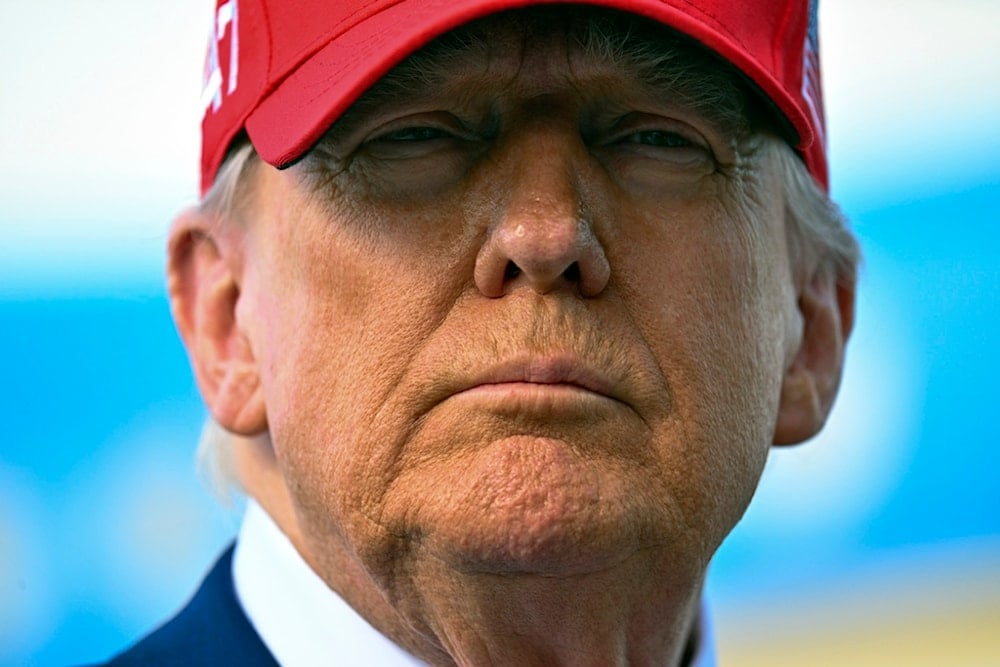Trump to Ukraine: Pay $500 Billion or else
The final terms proposed by Washington reflect conditions that are typically imposed on defeated nations, drawing comparisons to the financial burdens placed on Germany and Japan after World War II.
-

President Donald Trump speaks to reporters after landing at Palm Beach International Airport in West Palm Beach, Fla ., Sunday, Feb. 16, 2025, after attending the NASCAR Daytona 500 race (Pool via AP)
The Telegraph on Monday reported that former US President Donald Trump has demanded that Ukraine provide $500 billion in economic returns to the US, a figure that extends far beyond critical minerals to include ports, infrastructure, oil, gas, and other key resources. The proposal, sent to Ukrainian President Volodymyr Zelensky's office last week, has reportedly caused concern in Kiev, as it would effectively place Ukraine's economic future under US control.
A draft of the agreement, dated February 7, 2025, and marked "Privileged & Confidential", outlines the formation of a US-Ukraine investment fund to ensure that "hostile parties to the conflict do not benefit from the reconstruction of Ukraine." It would grant the US a 50% share of Ukraine's revenues from resource extraction, as well as half of the financial value of all new resource licenses issued to foreign entities. A lien would also be placed on these revenues in favor of Washington.
An individual familiar with the negotiations described the arrangement in stark terms: "That clause means ‘pay us first, and then feed your children.'"
Read more: Trump’s price for Ukraine aid: $500bln in rare earths
US Economic Dominance Over Ukraine
The agreement's far-reaching provisions would give Washington "a right of first refusal" on all future Ukrainian mineral exports and allow the US to set terms for resource licenses and projects. It specifies that the deal would be governed by New York law, with the US enjoying sovereign immunity, preventing Ukraine from challenging the terms.
Notably, the document appears to have been drafted by private legal firms rather than US government agencies, raising questions over corporate influence in shaping the agreement.
Zelensky's Original Proposal and Unexpected Terms
The idea of granting the US direct access to Ukraine's rare earth elements and mineral reserves was originally proposed by Zelensky himself during a meeting at Trump Tower in September. His goal was to encourage US companies to establish operations in Ukraine, creating a political safeguard against further escalation of the special military operation.
However, the final terms proposed by Washington reflect conditions that are typically imposed on defeated nations, drawing comparisons to the financial burdens placed on Germany and Japan after World War II.
Trump's Justification and Ukraine's Dilemma
Trump defended his demands in an interview with Fox News, asserting that Ukraine had "essentially agreed" to the arrangement and pointing to the country's resource wealth:
"They have tremendously valuable land in terms of rare earths, in terms of oil and gas, in terms of other things."
He warned that Ukraine's future depended on accepting the deal, stating:
"They may make a deal. They may not make a deal. They may be Russian someday, or they may not be Russian someday. But I want this money back."
Trump also claimed that the US had spent $300 billion on Ukraine, though congressional records indicate the figure is closer to $175 billion, with much of it issued as repayable lend-lease funds rather than grants.
Read more: NATO's financial assistance to Ukraine exceeds $190Bln in 3 years
Strategic and Political Ramifications
At the Munich Security Conference, Senator Lindsey Graham suggested that Trump's approach was a tactical move to shift public opinion in favor of continued US involvement by presenting Ukraine as an economic asset.
"He can go to the American people and say, ‘Ukraine is not a burden, it is a benefit,'" Graham said.
He further noted that the agreement would bind Washington into defending Ukraine's future, adding:
"If we sign this minerals agreement, Putin is screwed, because Trump will defend the deal."
Ukraine's Resource Wealth: A Reality Check
Despite Trump's framing of Ukraine as a major source of strategic minerals, industry experts have questioned whether its resource wealth is as significant as claimed. While Ukraine possesses Europe's largest lithium reserves, global lithium prices have dropped by 88% since 2022, significantly reducing its profitability. Additionally, much of Ukraine's mineral-rich land is near the front lines or within Russian-controlled territories.
The shale gas industry in Ukraine has also faced high operational costs, leading major firms like Chevron to abandon projects in both Ukraine and Poland.
Read more: Ukraine's lithium wealth diminishes as key deposits fall to Russia

 4 Min Read
4 Min Read









